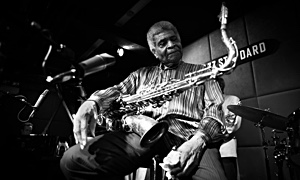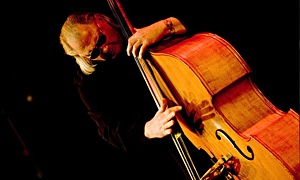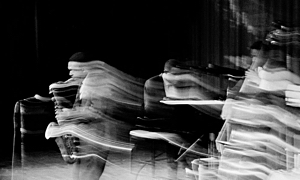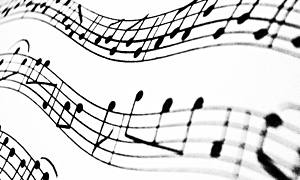Home » Jazz Articles » On and Off the Grid » Goodbye Borah
Goodbye Borah
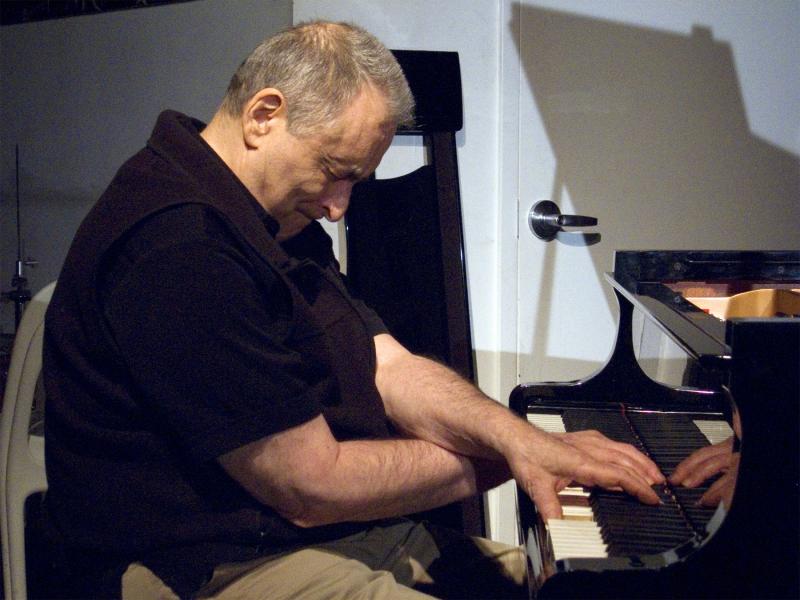
Many of my early public performing years were devoted to playing straight-ahead and then to an inside-out approach, and when I thought it was time, I went headfirst into the avant-garde. Although many of my musical friends knew about my avant-gardisim, I pretty much kept it under wraps for years, fearing it would put me out of work.
In 1999, with the release of Finishing Touches and Dialing Privileges (both on CIMP), and then in 2001, under the guise of my own record company, CDM, we released Takin' The Duke Out. I was accepted in the realm of the avant-garde world and pretty much became part of the New York City Downtown Scene. It was what I always wanted, and it was the first time in my life that I felt like I belonged somewhere and I could play the way I always wanted with like- minded musicians. It may have taken thirty years, but at least I got there.
When I decided to write this article I asked myself, should I be honest or should I just write a glitzy tribute and forget about the real man? Since I've been writing for All About Jazz, I've been honest about everything and haven't pulled any punches, so why start now?
I met Borah in 2002, when Jim Eigo, my promo guy, suggested I go to one of Borah's' concerts. I had no idea what to expect; Jimmy said "you'll be amazed.'" My wife, Carol, and I sat through the first set of the opening group and we anxiously waited for Borah to appear. Borah came out onstage, sat quietly at the piano for about 30 seconds. Then he played. With the very first flurry of notes I sat there with my mouth opened. His virtuosity, power, energy and his endless stream of ideas hitting the audience between the eyes staggered me. I had never heard piano played like that before. The forcefulness of his approach made me feel as though I was being lifted out of my seat. It was one of those rare times when you feel the artist is speaking directly to you. It was thrilling, to say the least.
After the concert, I anxiously waited for Borah to come out front. I introduced Carol and myself to him; showered him with praises and gave him a copy of Takin The Duke Out." I told him I would love to play with him sometime. All he said, in a kind of nasty tone, was, "I don't play with guitarists." I was taken aback by his rudeness. After all, I was praising his playing and he dismissed me like a child. A few days later he called and apologized for his behavior. Apparently, after asking around and listening to my CD, he called and asked when we could get together. That was the beginning of an eight-year love-hate relationship.
About a week later I showed up at his studio apartment on the Upper Westside of New York City. There was so much stuff surrounding the door, I could hardly get through with my equipment. I quickly set up, for I was anxious to play. He told me to settle down and "let's talk." So we talked and talked and talked. Two hours went by and we were still talking. We talked about everything, mostly about music and musicians. He critiqued my record, practically note-per-note, and he talked endlessly about his left hand. At first I wasn't getting it. What's the big deal about the left hand? The big deal was that Borah could play a totally different improvised line with his left hand while improvising another line with his right hand. It was like sax and trumpet playing solos at the same time. It was truly an amazing feat.
After more than two hours I asked him if we were going to play at all. He sat at the piano and played. We played for about two minutes and he stopped and talked some more. This time it was to demonstrate exactly what his left hand was doing. Meanwhile I was trying to figure out how to play against the machine gun surge of notes coming from both hands. He stopped to talk again. I left there after three hours only playing about three minutes of music. It was frustrating, to say the least.
For the next month we got together once a week and every time we did, the same thing would happen. Talk, talk, talk, play, talk, talk. Besides all the talking at his place, he would phone me and talk some more, mostly about how his left-hand technique was improving. As frustrating as it was, I hung in there. I knew other musicians were coming over to play too and I soon realized he had dual reasons for this. There wasn't that much work around and although he constantly practiced, he needed to play. The other reason was loneliness. At times Borah was a hard man to get along with. He could be opinionated, abusive and rude, and it was hard for anyone to sit through that and be creative and friendly at the same time. I know many musicians who played with him once and swore "never again!"
By the third month, we were starting to play more and talk less; I finally figured out how to play with him. At first, I wondered, since he is playing so fast, should I play slow long tones? That didn't work. Guitar is not a long tone instrument unless you're using some kind of fuzz box, which I don't do-and Borah would have kicked me out. I thought I would go for natural sound effects; that didn't work. Chords were impossible, too. I finally realized that I had to play at his level, meet him note-for-note and lightning fast, but when he was playing high, I had to be low. When he was low I had to be high and when he was both high and low, I would be in the middle. It took an immense amount of concentration. At times it sounded like there were three separate parts being played at the same time, and when I played double stops it was another thing all together. Going into the fourth month we were making the kind of music I always dreamed of.
After the first year, I was able to get us three weekends at the 5C, a small club in NYC. This would be the first time we would play together in public. To make sure everything went right, I picked Borah up and took him home. Up until the first note was played I was nervous that, for some unknown reason, he would back out. Why would I think that? During our many talks, Borah mentioned how he had backed out of some bookings by not showing up. It didn't matter to him what the financial or reputation cost would be. If he didn't want to do it, he didn't and to hell with everybody. After that story I knew he couldn't be trusted. He would cancel at a drop of a hat with some lame excuse. He needed to be gently coaxed and watched and I had to be prepared for anything. The performances went well, even though Borah constantly complained about the piano.
Borah and I were at our best when we disassembled a jazz standard. When I think back to those times I can't believe we actually played some great music together despite the difficulty. There were times he would taunt me with, "You know what they are saying about you?" Or, "You're not an avant-garde player, you're a more of a modern player," or "A lot of musicians don't like the way you play." He could go on and on, but I know that was nothing compared to what he would say to other musicians, like, "You stink" or "Go home and learn how to play." Borah had no patience for "almost." If you wanted to play with him, you better play and play at your best all the time. There was no such thing as warming up. You'd start at 150 miles an hour and go up from there. He was relentless. He could play a slow ballad with lots of feeling but, in the midst of the piece, he would come out with bursts of sixty-fourth notes and shatter the mood. Musically it's as if his mind was in a race going in all directions at the same time, and whatever musical idea got there first he played.
One time he was especially abusive about everything. He was angry and aimed his anger at anyone in his near vicinity. Unfortunately, that day it was me. After a few minutes of playing and his barking at me, I stopped. I looked at him and told him "Who do you think you're talking to? You know Borah, I've had enough. Go fuck yourself, I'm done. I don't care how great you are, this is not worth it." I packed up and left. In all the time we had played together I had never lost my temper with him, but this time he went too far. That night he called and spoke to my wife first and then me. He was very apologetic and seemed truly sorry. I forgave him and we went back to playing again, and he backed off a little.
There were times I was truly worried about him. Once I called the doorman in his building because he wasn't answering his phone all day. It turned out he was on some new drug that put him to sleep. He very rarely went out, so I felt he had to be looked after at times.
In 2006 I recorded The Vampire's Revenge (CDM). This was a double-disc recording with almost two hours of free and written music, with a conductor. It gave me a chance to expand my writing and use different groups of musicians in developing a story line that went with the title. "Blood Lust" was the longest piece on the record. It was over seventeen minutes long and was recorded at two different studios with three different groups. There were sections for a large group, duo and septet. The duo section featured Borah and myself playing free for about three-and-a-half minutes. I told Borah about the project months before and asked him if he would do it. He agreed. The day of the recording I picked him up and brought him to the studio. When I record, I prefer using headphones because I like to plug in directly into the board, but Borah wouldn't use headphones and he also told me which guitar he preferred me to use. The setup with the amp was a little uncomfortable for me, but it would be worth it to have this man on record.
We played a little, just for the sound, and when we were ready to record, Borah took out a watch and laid it on the piano. We started with a burst and kept going non-stop and, at exactly three minutes, we started to build to a climax and, thirty seconds later, we stopped with an accented note. There were no signals or head nods. After spending so much time playing together we instinctively knew when to stop. I was satisfied with the first cut, but Borah was such a perfectionist he wanted to do it again. Since I was the leader and paying for this, I told him absolutely not. If I left it up to him we would be there all day and never get it as good as the first cut. The reviews would later prove me right.
As the years went by we kept playing together, but Borah's physical and mental health were in decline. It seems the older he got, the more difficult he was to get along with.
A few years ago I had some health problems and I didn't have the energy to deal with Borah and his negativity. I needed to be around positive energy and, although the music with Borah was positive, his negative personality would have brought me down and I needed to heal. Every once in awhile we would talk on the phone, and the last time I saw him was at a benefit I was performing in the winter of 2010. We talked for a while and promised each other we would play together soon, but it never happened.
Last year, violinist Jason Kao Hwang, who befriended Borah too, called to tell me that, because of his declining health, Borah had moved to Baltimore to live with his sister. I called him. He could hardly remember me. It sounded like Dementia or Alzheimer's disease. I realized that all this time Borah's abusiveness might have been the escalation of the disease.
On October 18th 2012, Borah died. That same day I thought about him and said to myself I should call, I hope he's OK. A few hours later I got an email from Jim Eigo that he was gone.
Jason started a Facebook page for Borah and, surprisingly, hardly anyone has posted or made a comment. Musicians from all over the world would clamor to play with him and yet it's as if he's already forgotten. I haven't and I never will.
Although Borah was a lot to put up with it, it was always a thrill to play with him. There were times we talked about recording a CD together, but that never happened. It should have because it would have been a remarkable recording.
It is very rare to be in the mist of genius, but when you are, it is amazing. I am sad that he is gone. Because of him I am a better player and as hard as it was, I would do it all over again.
Goodbye Borah. Rest in peace.
Photo Credit
Scott Friedlander
< Previous
Lost In The Stars: The Music Of Berns...
Next >
Landing Ground
Comments
Tags
Borah Bergman
On and Off the Grid
Dom Minasi
Jim Eigo, Jazz Promo Services
United States
Cecil Taylor
Jason Kao Hwang
For the Love of Jazz
 All About Jazz has been a pillar of jazz since 1995, championing it as an art form and, more importantly, supporting the musicians who create it. Our enduring commitment has made "AAJ" one of the most culturally important websites of its kind, read by hundreds of thousands of fans, musicians and industry figures every month.
All About Jazz has been a pillar of jazz since 1995, championing it as an art form and, more importantly, supporting the musicians who create it. Our enduring commitment has made "AAJ" one of the most culturally important websites of its kind, read by hundreds of thousands of fans, musicians and industry figures every month.






